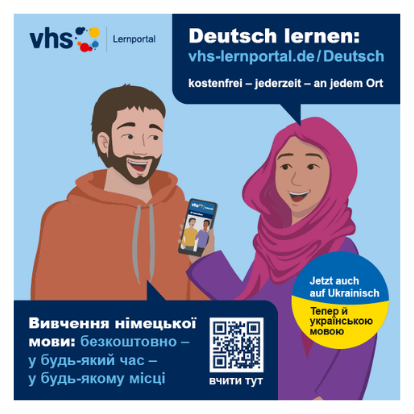Language courses
Summary
Content
The acquisition of the German language is central to the job search and integration of refugees. It is true that Ukrainian refugees have a chance of finding work in Germany even without German language skills. But with German language skills, there is more choice and it is easier to find more qualified jobs.
Even before refugees have learned German intensively, it can be helpful to assess their work experience. This offer is suitable for this offerwhich helps with the self-assessment of professional skills in twelve languages.
Online courses
German can be studied on a self-study basis with flexible time management through online offers can be learned. Below you will find a selection of possible providers:
- The Adult Education Center portal is a free digital learning offering for German as a second language, literacy, and basic education and is intended as an ideal supplement to classroom courses or to bridge waiting times before longer-term language courses start. The courses can also be used as an app with a smartphone.
- Five-week digital live language courses, in which Ukrainians can also take part via smartphone, are offered by the language service of careertutor.com.
- The provider Lingoda currently offers free online German courses seven days a week at 10 am and 4 pm. The courses are underpinned with free learning materials.
- Paid online and face-to-face courses at different language levels are offered by the StartGerman School offers. Classes are mostly held in the evenings and can be attended up to 5 times per week for 150 minutes each.
- The world's best-selling online language learning platform Babel and the program Jicki currently offer free German language courses for Ukrainian refugees.
- Under the title "My way to Germany" the Goethe-Instituts take care of language mediation for war refugees from Ukraine with various topics on professions, everyday life and an online vocabulary book.
- The Deutsche Welle offers a free online service with exercises and videos for different language levels. Here you will also find a small section on various training professions.
- Free individual lessons are available on this platform on this platform. The offer mediates private German teachers to those willing to learn. The lessons can be conducted either on site or online.
Integration course
Refugees from Ukraine with residence permit can participate free of charge in an integration course free of charge. In addition to orientation courses on topics such as culture and politics, this also includes an intensive language course. The language training lasts about 600 hours and is concluded with an examination for language level B1.
To enroll in an integration course, a certificate of eligibility is required. In most cases, an application must be submitted to the Federal Office for Migration and Refugees. At this page you can directly check the local offers, availability, starting times and types (full or part-time, normal or intensive course) of the integration courses in your area.
Other offers on site
Besides integration courses there are other language course offerings on site.
- Language courses geared to different professions are offered, for example, by the Goethe Institutes.
- Other places to go for free language courses are local adult education centres and, in some cases, church family education centres.
Dictionaries and vocabulary lists
In addition to courses, phrasebooks also help with the acquisition of a new language. Especially at the beginning, you can quickly build up a basic vocabulary to make everyday tasks easier. Free phrasebooks are offered by letters.com or the International Federation. The Klett publishing house and deutsch-lenen.zum.de have published free dictionaries.
Language level
Benchmark for the acquired language level of immigrants is the so-called Common European Framework of Reference for Languages (CEFR). There, the language levels are divided into: Elementary Language Use (A1 and A2), Independent Language Use (B1 and B2) and Competent Language Use (C1 and C2). Under this link you will find a detailed description of each language level. And on leangerman.dw you will find a test, to determine the language level of refugees. The classification into language levels can help you find a suitable language course.








